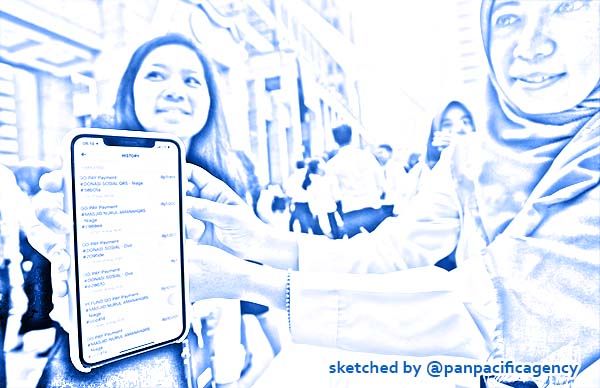China’s WeChat and Alipay seek way to legally operate in Indonesia

WeChat and Alipay previously received flak from Bank Indonesia, which is responsible for regulating payment systems in the country, after providing their payment services to Chinese tourists in Bali last year without licenses. (B1 Photo/Mohamad Defrizal). Sketched by the Pan Pacific Agency.
JAKARTA, Aug 19, 2019, Jakarta Globe. Three local banks have applied to Bank Indonesia for licenses to cooperate with WeChat and Alipay, paving the way for the Chinese digital payment giants to operate legally in the archipelago, reported the Jakarta Globe.
WeChat and Alipay previously received flak from the central bank, which is responsible for regulating payment systems in the country, after providing their payment services to Chinese tourists in Bali last year without licenses. Bank Indonesia told the Chinese companies at the time that they had to cooperate with local lenders if they wished to operate in the country.
“Now we have received [requests for licenses] from three banks,” Filianingsih Hendarta, the head of Bank Indonesia’s payment system policy department, said on Saturday, as quoted by Antara news agency.
Filianingsih said WeChat and Alipay will cooperate with banks with core capital of more than Rp 30 trillion ($2.1 billion), to ensure that the lenders have adequate cash to handle the size of transactions or cope with currency fluctuations in cross-border transactions.
Bank Central Asia, Indonesia’s largest listed private lender by assets, confirmed that it was paving the way to cooperate with the two Chinese digital payment companies.
BCA president director Jahja Setiaatmadja said the lender would integrate its system with those of WeChat and Alipay.
“I think, hopefully by early 2020, we can cooperate with WeChat and Alipay,” he said.
WeChat and Alipay will compete with OVO, which is backed by the Lippo Group; Gojek Indonesia’s Go-Pay; the Emtek Group and Ant Financial’s DANA; and state-controlled LinkAja.